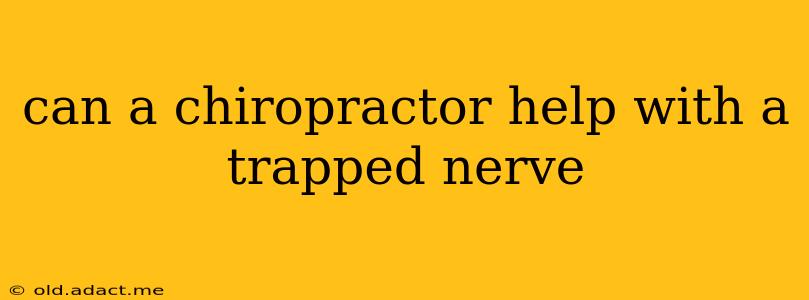A trapped nerve, also known as a pinched nerve, occurs when excessive pressure is placed on a nerve, causing pain, numbness, tingling, and weakness. This pressure can stem from various sources, including bone spurs, herniated discs, swelling, or muscle spasms. Many people wonder if a chiropractor can help alleviate the discomfort and restore proper nerve function. The answer is often yes, but let's delve deeper.
What Causes a Trapped Nerve?
Before exploring chiropractic treatment, understanding the root causes of a trapped nerve is crucial. Several factors can contribute:
- Poor Posture: Maintaining poor posture for extended periods can put undue strain on the spine, leading to nerve compression.
- Repetitive Movements: Jobs or activities involving repetitive motions can gradually irritate nerves and cause inflammation.
- Injury: A sudden impact, such as a fall or car accident, can directly damage nerves or vertebrae, leading to nerve compression.
- Spinal Degeneration: Age-related wear and tear on the spine can lead to bone spurs and herniated discs, which can compress nerves.
- Obesity: Excess weight can strain the spine and increase the risk of nerve compression.
How Can a Chiropractor Help with a Trapped Nerve?
Chiropractors focus on the musculoskeletal system and its impact on the nervous system. Their approach to trapped nerves typically involves:
- Spinal Adjustments: Chiropractic adjustments aim to restore proper alignment of the spine. By gently manipulating the vertebrae, chiropractors may relieve pressure on the affected nerve. This is a key method in addressing the mechanical aspect of nerve compression.
- Soft Tissue Mobilization: Tight muscles surrounding the affected nerve can exacerbate the problem. Chiropractors often use soft tissue techniques, like massage or stretching, to release muscle tension and reduce pressure on the nerve.
- Postural Correction: Identifying and correcting poor posture is vital in preventing future nerve compression. Chiropractors provide guidance and exercises to improve posture and reduce strain on the spine.
- Lifestyle Modifications: Chiropractors may advise changes to lifestyle factors contributing to the problem, such as ergonomic adjustments at work, regular exercise, and weight management.
- Therapeutic Exercises: Specific exercises strengthen the muscles supporting the spine, improving stability and reducing the likelihood of nerve compression.
What are the Other Treatment Options for a Trapped Nerve?
While chiropractic care can be highly effective, other treatments may be necessary depending on the severity and cause of the trapped nerve. These may include:
- Over-the-counter pain relievers: Ibuprofen or naproxen can help manage pain and inflammation.
- Prescription medications: In more severe cases, a doctor might prescribe stronger pain relievers or muscle relaxants.
- Physical therapy: Physical therapy exercises can strengthen muscles and improve flexibility, easing pressure on the nerve.
- Surgery: In rare cases where conservative treatments fail, surgery might be considered to relieve pressure on the nerve.
Does Chiropractic Care Hurt?
Many people worry about the pain associated with chiropractic adjustments. However, most patients report only mild discomfort. Reputable chiropractors carefully assess the condition and adjust accordingly, using gentle techniques to minimize any pain.
How Long Does it Take to Recover from a Trapped Nerve?
Recovery time varies significantly depending on the severity of the nerve compression and the individual's response to treatment. Some experience relief within a few sessions, while others may require more extensive care. Consistent treatment and adherence to lifestyle modifications are crucial for optimal recovery.
When Should I See a Doctor?
While chiropractic care can be effective for many trapped nerve cases, it's essential to consult a doctor if:
- Your pain is severe or doesn't improve with treatment.
- You experience numbness or weakness that spreads to other parts of your body.
- You have bowel or bladder dysfunction.
- You suspect a serious underlying condition.
This information is for general knowledge and does not constitute medical advice. Always consult a healthcare professional for diagnosis and treatment of any medical condition. They can help determine the best course of action based on your individual needs and circumstances.
